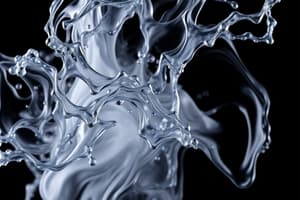Podcast
Questions and Answers
What characteristic distinguishes cohesion from adhesion in fluids?
What characteristic distinguishes cohesion from adhesion in fluids?
- Cohesion applies to gases only, while adhesion applies to liquids.
- Cohesion involves the attraction between different substances, while adhesion involves attraction between similar substances.
- Cohesion is the force that holds similar molecules together, while adhesion is the force that holds different molecules together. (correct)
- Cohesion refers to the pressure exerted by a fluid, while adhesion refers to fluid flow patterns.
Which of the following statements about the properties of gases compared to liquids is correct?
Which of the following statements about the properties of gases compared to liquids is correct?
- Gases flow more easily than liquids due to less intermolecular attraction. (correct)
- Gases have a stronger cohesion than liquids.
- Gases are incompressible, while liquids are compressible.
- Gases have a definite volume while liquids do not.
What is viscosity primarily a measure of?
What is viscosity primarily a measure of?
- The buoyancy of the fluid.
- The pressure within the fluid.
- The fluid's resistance to flow. (correct)
- The density of a fluid.
In terms of fluid dynamics, what is the primary difference between hydraulic and pneumatic systems?
In terms of fluid dynamics, what is the primary difference between hydraulic and pneumatic systems?
Which of the following best defines the term 'inputs' in a system?
Which of the following best defines the term 'inputs' in a system?
Which type of fluid flow is characterized by smooth and orderly motion?
Which type of fluid flow is characterized by smooth and orderly motion?
What characterizes the purpose or goal of a system?
What characterizes the purpose or goal of a system?
Which example correctly illustrates a side effect of a system?
Which example correctly illustrates a side effect of a system?
Which of the following statements correctly differentiates between inputs and outputs?
Which of the following statements correctly differentiates between inputs and outputs?
In the context of systems, which example best represents an output?
In the context of systems, which example best represents an output?
What distinguishes a physical system from a social system?
What distinguishes a physical system from a social system?
Which of the following best describes subsystems?
Which of the following best describes subsystems?
What is a mechanism in the context of physical systems?
What is a mechanism in the context of physical systems?
Which statement accurately defines automation in comparison to human labor?
Which statement accurately defines automation in comparison to human labor?
Which scenario best illustrates how systems evolve over time?
Which scenario best illustrates how systems evolve over time?
Which of the following illustrates the relationship between mechanical advantage (MA) and work?
Which of the following illustrates the relationship between mechanical advantage (MA) and work?
What is the primary purpose of using simple machines with different mechanical advantages?
What is the primary purpose of using simple machines with different mechanical advantages?
What distinguishes ideal mechanical advantage from actual mechanical advantage?
What distinguishes ideal mechanical advantage from actual mechanical advantage?
Flashcards
Cohesion
Cohesion
The attraction between molecules of the same substance, like water molecules sticking to each other.
Adhesion
Adhesion
The attraction between molecules of different substances, like water molecules sticking to glass.
Surface Tension
Surface Tension
The force that causes a liquid's surface to act like a stretched membrane, due to cohesion between molecules.
Meniscus
Meniscus
Signup and view all the flashcards
Viscosity
Viscosity
Signup and view all the flashcards
Physical System
Physical System
Signup and view all the flashcards
Social System
Social System
Signup and view all the flashcards
Subsystems
Subsystems
Signup and view all the flashcards
Mechanism
Mechanism
Signup and view all the flashcards
Mechanical Advantage
Mechanical Advantage
Signup and view all the flashcards
Work
Work
Signup and view all the flashcards
Energy
Energy
Signup and view all the flashcards
Weight
Weight
Signup and view all the flashcards
Inputs
Inputs
Signup and view all the flashcards
Outputs
Outputs
Signup and view all the flashcards
Side Effects
Side Effects
Signup and view all the flashcards
Distinguish between Inputs and Outputs
Distinguish between Inputs and Outputs
Signup and view all the flashcards
Identify Side Effects
Identify Side Effects
Signup and view all the flashcards
Study Notes
Fluids - Success Criteria
- Students need to distinguish between cohesion and adhesion
- Fluids - characteristics, Particle Theory
- States of Matter - solid, liquid, and gas
- Distinguish between the properties of gases and liquids
- Flow - turbulent, laminar, streamlining
- Cohesion, Adhesion, Surface Tension
- Meniscus
- Fluid mechanics, fluid dynamics, hydrodynamics, aerodynamics
- Calculate flow rate and give correct units
- Explain pressure and compressibility
- Explain the difference between hydraulic and pneumatic systems
- Explain viscosity and distinguish between high and low viscosity
Studying That Suits You
Use AI to generate personalized quizzes and flashcards to suit your learning preferences.




